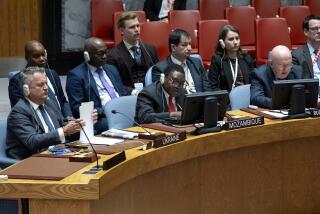Ethnic Groups Seen as New Rights Foes : Repression: Governments will pose a lesser threat to the new Europe, says U.S. delegate to 38-nation conference.
- Share via
MOSCOW — In a changing Europe, the main human-rights problems are likely to be caused by conflicts between ethnic groups rather than government oppression of individuals, the chairman of the U.S. delegation said Friday at the conclusion of a major human rights conference here.
“The days of protesting the old kind of atrocities of governments are over,” Ambassador Max M. Kampelman said. “But there are new challenges--challenges of the nationality character.”
During the four-week meeting, the Conference on Security and Cooperation in Europe backed away from long-held notions of noninterference in the internal affairs of member nations, deciding in a major diplomatic shift that human rights are the “legitimate concern” of all nations.
Delegates from the 38 countries that now make up the conference said in their final declaration that they had agreed for the first time that it would be legitimate to send a fact-finding mission into a member nation without its approval to investigate suspected human-rights violations.
Under the new policy, three-member investigation teams would be sent in to study alleged human rights abuses with the authorization of 10 member countries or of a committee of senior officials of the conference.
Although Kampelman praised the new policy as a new “moral weapon,” Sergei Kovalev, a former political prisoner and leader of the Soviet delegation, said it is not sufficient because it fails to specify mandatory sanctions for human-rights violations.
The meeting, which was held after August’s aborted coup by Communist hard-liners in Moscow, also condemned illegal seizures of power and stressed the need for civilian control of military and paramilitary forces, internal security and intelligence services and police.
The group’s concluding declaration also promoted improvements in areas as various as nondiscriminatory treatment of women, the further easing of internal travel restrictions and the safeguarding of independent media.
“We have again moved Europe forward significantly toward taking seriously the values we think represent a higher form of civilization,” Kampelman said.
As one of the West’s principal structures for monitoring human rights practices, the Conference on Security and Cooperation in Europe has until now had only its political and moral authority to remind members of their obligations.
It nevertheless has had a large impact on the course of Europe over the last 20 years, helping reduce and then end the East-West conflict. Last November, it provided the forum for a European summit conference in Paris for the signing of a treaty sharply reducing the conventional armed forces in Europe.
The shifting focus on human rights was evident during the Moscow conference as Yugoslavia slipped closer to civil war and violence broke out in several of the republics of the Soviet Union.
Kampelman said that the group should have moved much more quickly in trying to forge a peaceful solution to the conflicts between ethnic groups in Yugoslavia, but that it had not yet decided on its role in such affairs.
The conference rejected a request for observer status at the meeting by representatives of Georgia, a southern Soviet republic where at least five people died in violence between the strong-armed government and its opposition last month.
“We do not see, as of this moment, a commitment of the republic of Georgia to the Helsinki treaty,” Kampelman said, referring to the initial 1975 statement made by the conference, which now includes all the countries of Europe as well as the United States and Canada.
Kampelman said the festering ethnic problems in the nations that made up the former Soviet bloc result from the refusal of their hard-line governments to allow those countries to develop with the rest of the world.
“It’s just as if we were back in the last century,” Kampelman said. “There has not been a political maturation process in Eastern and Central Europe.”
Because of this, republics are willing to fight to get out of the nations of which they are part, Kampelman continued.
“The self-determination of people does not include the right to secede,” he said. “If you want to secede, you have to negotiate, not use violence. That’s the essence of stability.”
If violence is considered an acceptable way in the new Europe to gain independence, Kampelman warned, “Europe is doomed to one crisis after another.”
More to Read
Sign up for Essential California
The most important California stories and recommendations in your inbox every morning.
You may occasionally receive promotional content from the Los Angeles Times.













